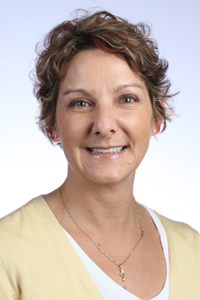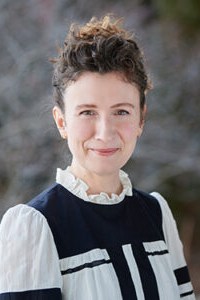Albion College professors will have impact on Artemis Moon exploration
June 21, 2023
By Ward Mullens
It has been more than 50 years since the last NASA mission to the surface of the Moon. The excitement generated in July 1969 when Neil Armstrong stepped onto the Moon began a space revolution that is about to come full circle.
With a target date of 2025, NASA is planning a return to the lunar surface, and Albion College will make its own impact.

Nicolle Zellner, professor of physics
Albion College Professors Nicolle Zellner and Carrie Menold will be part of the Center for Advanced Sample Analysis of Astromaterials from the Moon and Beyond, or CASA Moon, which will decipher the origin, evolution and chronology of the ancient lunar crust through lunar sample analyses.
CASA Moon is one of five new research teams that will collaborate on lunar research to support future exploration of the Moon as part of the agency’s Solar System Exploration Research Virtual Institute, or SSERVI.
SSERVI will support each of the new teams for five years at about $1.5 million per year, jointly funded by NASA’s Science Mission Directorate and Exploration Systems Development Mission Directorate. The focus for this call is on lunar science and sample analysis to enable the future human and robotic exploration of the Moon with NASA’s Artemis program and Commercial Lunar Payload Services initiative. The work will take place in cooperation with U.S and international partners. These teams join eight SSERVI teams who were selected in 2019.
“It’s an incredible opportunity to be able to work and interact with others under this umbrella,” said Zellner, chair of the Albion College Physics Department. “Brainstorming with experts all over the world and working on such a multifaceted lunar sample project is exciting.”

Carrie Menold, professor of Earth and the environment
“I am very excited to work with Nicolle and the CASA Moon team,” said Menold, chair of the Albion College Earth and Environment Department. Menold is also the project director for Albion’s inclusion program, “Blueprint for Belonging.”
Zellner will use her expertise in impact glasses to conduct geochemical analyses on how they are formed and when they are formed. She will be analyzing samples from the original Apollo lunar missions.
“Looking at how these glasses are formed and when they are formed can help us understand Earth’s bombardment history, how life may have been affected by the impacts, and how some biomolecules are delivered and chemically altered,” Zellner said.
“Through other work I have done at Albion, we know that impacts do not destroy those molecules and that they form other kinds of molecules. The delivery of those molecules provides a resource for life or for things that became early life.
“What we learn about the bombardment rate on the Moon helps us understand the bombardment on Earth and in the solar system. It could even provide an understanding of conditions experienced by potential life on Mars.”
Menold’s role on the team is based on her extensive experience with inclusion and equity.
“I am the liaison for the team’s inclusion plan and helping with community outreach,” said Menold. “I am leading the internal evaluation of the inclusion plan and helping to guide how the team will operate and work together. My involvement builds on what I have learned in the AGU LANDInG Academy and the work we are already doing here on campus.”
Both Zellner and Menold emphasized what this opportunity means to the Albion students and the community.
“This is great for us, but more importantly it will provide our students with an opportunity to be involved. There will be community events, too,” Zellner said.
That involvement has yet to be mapped out, but Zellner said Albion College students could work on the project as “citizen scientists” and help in collecting data. There will also be community outreach elements that will involve K-12 students.
The CASA Moon team will be led by Charles “Chip” Shearer at the University of New Mexico, or UNM. Shearer is the senior research scientist of the Institute of Meteoritics and a research professor at the Department of Earth and Planetary Sciences at UNM.
“We will make great science and exploration breakthroughs because of collaborations among team members,” said Shearer.
Nationwide partners of CASA Moon include Albion College, Brown University, the University of Colorado, the Lunar and Planetary Institute, Goddard Space Flight Center, Johnson Space Center and the Lawrence Livermore National Laboratory.
International partners from Australia (Australian National University, Curtin University), Spain (Autonomous University of Barcelona), Canada (University of Western Ontario) and Denmark (University of Copenhagen) will also be involved in CASA Moon’s research.
“What this opportunity says to the Albion College community is that you can do cutting-edge, NASA-funded science at Albion College,” Zellner said. ‘You can do really cool work at a small liberal arts college.”
For more information watch Zellner and Menold on WOOD TV.